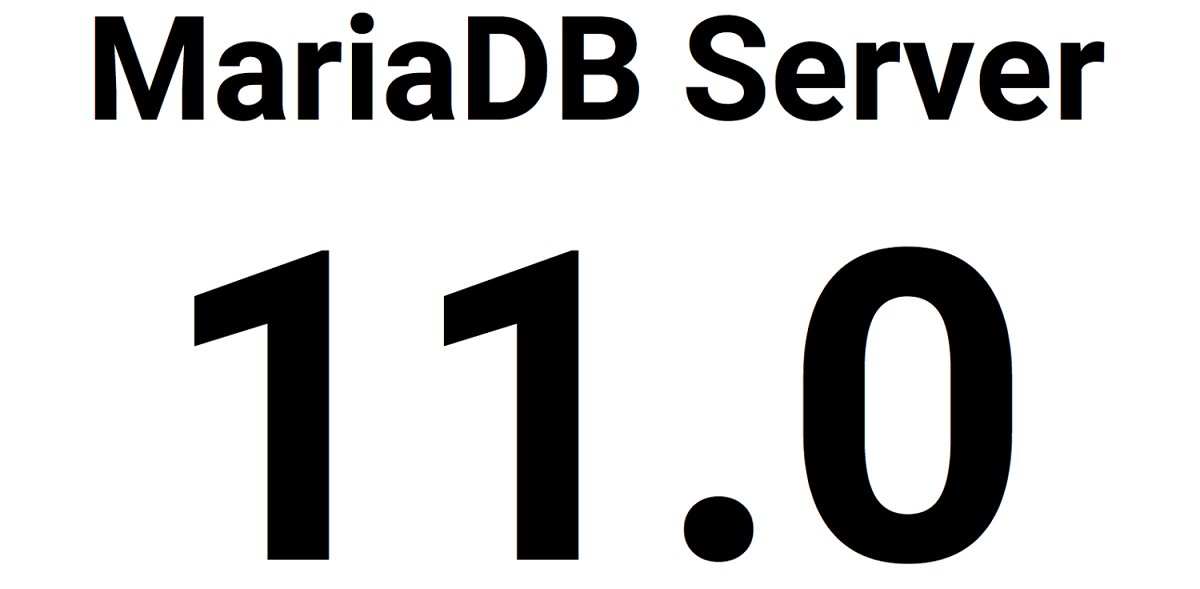
MariaDB 10.0.0 was released over ten years ago (November 12, 2012)
10 years after the founding of the 10.x branch, finally the new version and branch of MariaDB 11.0.0 was released, who brings several important improvements and breaks compatibility changes.
MariaDB 11 has already been released and these are its news and it will be ready for production use after stabilization. The next significant branch of MariaDB 12, containing changes that break compatibility, is expected to be no sooner than 10 years (in 2032).
For those who are unaware of the MariaDB project, you should know that it develops a fork of MySQL that maintains backwards compatibilitys wherever possible and is distinguished by the integration of additional storage engines and advanced features.
The development of MariaDB is overseen by the independent MariaDB foundation, following an open and transparent development process independent of individual vendors. MariaDB ships instead of MySQL on many Linux distributions.
Main new features of MariaDB 11
In this new release of MariaDB 11 one of the key improvements in the branch is the query optimizer translation to a new weighting model (cost model), which provides a more accurate prediction of the weights of each query execution plan. While the new model removes some performance bottlenecks, it may not be optimal in all scenarios and some queries may slow down, so users are encouraged to participate in testing and notify developers in case of any issues. problems.
The above model worked well to find the optimal index, but had issues with the applicability of table scans, index scans, or range lookups. In the new model, this disadvantage is eliminated by changing the basis weight of operations with the storage engine.
performance evaluations for disk-intensive operations such as sequential write scans, now they assume that the data is stored on an SSD with a read capacity of 400 MB per second. Additionally, other weight parameters of the optimizer were refined, which, for example, made it possible to implement the possibility of using indexes for "ORDER BY/GROUP BY" operations in subqueries and to speed up work with very small tables.
Another novelty that stands out is that the new weighting model will allow choosing a more optimal query execution plan in the following situations:
- When using queries that span more than 2 tables.
- When there are indices that contain a large number of identical values.
- When using ranges that cover more than 10% of the table.
- When you have complex queries where not all the columns used are indexed.
- When using queries that involve different storage engines (for example, when a query contains access to tables in the InnoDB and Memory engines).
- By using FORCE INDEX to improve the query plan.
- When the query plan is downgraded in the case of using "ANALYZE TABLE".
- When the query spans a large number of views (large number of nested SELECTs).
- When using ORDER BY or GROUP BY clauses that match indexes.
On the part of compatibility break In this new version of MariaDB 11, the following breaks that we will find in this new branch are mentioned:
- SUPER rights no longer allow you to perform actions for which separately set privileges are available. For example, changing the format of the binary logs will require BINLOG ADMINISTRATOR rights.
- Removed the change buffer implementation in InnoDB.
- Deprecated innodb_flush_method and innodb_file_per_table.
- Support for mysql* names has been deprecated.
- Deprecated setting explicit_defaults_for_timestamp to 0.
- Symbolic links have been moved to a separate package for compatibility with MySQL.
- The value of the innodb_undo_tablespaces parameter has been changed from default to 3.
Finally if you are interested in knowing more about it about this new release, you can check the details in the following link